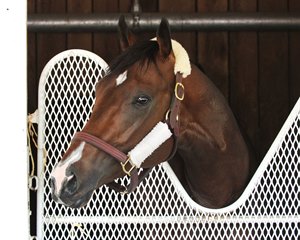Epiglottis Surgery Should Give Omaha Beach Great Future


The condition that ended Omaha Beach's chances of running in the May 4 Kentucky Derby Presented by Woodford Reserve (G1) is familiar enough to horsemen but remains a fairly uncommon diagnosis among performance animals.
The son of War Front owned by Rick Porter's Fox Hill Farm will undergo a procedure, likely May 3, to correct an entrapped epiglottis. The operation will be performed by Dr. Rolf Embertson of Lexington's Rood & Riddle Equine Hospital.
"Hopefully, it will be straightforward," Emberston said Thursday, the day after morning-line favorite Omaha Beach was withdrawn from the Derby. "This condition occurs in about 3% of racehorses. Depending on how much tissue is entrapping the epiglottis and how inflamed it is, there is a range of difficulty as far as recovery. But we should have a good prognosis on this horse.
"What you worry about is swelling in the tissue post-op. Sometimes it's a day or two before you know."
Optimistic estimates have Omaha Beach returning to training within two or three weeks, with the possibility of returning to be a force in grade 1 races such as the Haskell Invitational, Travers, and Pennsylvania Derby as well as other major year-end events.
The procedure to correct an entrapped epiglottis goes back a century. Dr. Robert McCully, a New York-based veterinarian who treated horses such as Colin and Man o' War, is credited with developing the surgery. McCully was a racetrack steward as well as a vet, and reacted to various instances in which a horse was "sponged," or had a sponge inserted in its nasal passages to negatively affect its performance.
Dr. Jeff Blea, who attends to trainer Richard Mandella's horses in California, is Omaha Beach's vet when he is stabled in the Golden State. Blea said while he sees cases of entrapped epiglotti in clusters, it is still a fairly uncommon condition. Blea noted that Omaha Beach showed no signs of any problems before his journey to Oaklawn Park for the Arkansas Derby (G1).
"We tend to look aggressively at those things, trying to see any tissue swelling, but he had none of it," noted Blea. "I probably do five or six of those surgeries in a year. We'll get three in a weekend and then go a long time without seeing one."
An entrapped epiglottis does not necessarily grow out of stress from training or a race. The condition happens in yearlings, for example, and can be caused by a virus or allergy. If inflammation is discovered, it is treated initially by either corticosteroids, nebulizers, or throat flushes. The epiglottis can also be manually unentrapped, although the condition can recur without surgery.
Dr. Vince Baker, who is attending physician in the Bob Baffert barn in California and has worked with all of that stable's top runners, including American Pharoah , said if the condition is caught early enough, it consists of just irritated tissue that can be treated.
"Horses' tongues are tied so they don't swallow the tongue. In the swallowing process, the epiglottis (a triangle-shaped cartilage) comes up to cover the airway and the arytenoid cartilage shuts so the food goes up above it and down the esophagus. The epiglottis goes up, the soft palate goes up, then the soft palate goes down first and then the epiglottis goes down on top of it," Baker said. "If that doesn't continuously work in that sequence, the aryepiglottic fold chronically displaces and gets irritated. That's what goes over the top of and entraps the epiglottis. If it sits up top over the epiglottis long enough, food particles can get in there and you can get little ulcers stuck to the tissue of the epiglottis."
The surgery itself can be performed with the horse standing and receiving a local anesthesia. A probe is put through the nose that has a hook and a sharpened edge. The surgeon hooks it over the entrapment and then slices the tissue, which flips off and then hooks under the epiglottis, from where it originated.
Timing is everything. Roadster, who will be one of the Derby favorites, had a similar condition diagnosed after running third in the Del Mar Futurity (G1) late last year. Because it occurred on the left side of his breathing passage, his procedure was known as a tie-back surgery.
"The common name for that is a flapper," said Baker, who did not perform the surgery on Roadster. "It's when there is decreased function in the arytenoid cartilage. When a foal is born, the heart drops down and the nerve that goes to the right arytenoid goes from the spinal cord straight down to the muscle that opens and closes the arytenoid.
"The left laryngeal nerve goes from the neck around the base of the heart and then all the way back to the muscle that opens and closes the left side, so that's why the majority of the time it's the left flapper that loses function. It's the length of the nerve."
Roadster has come back like new money, winning both his starts this year, including the Santa Anita Derby (G1). In Kentucky Derby history, 1987 winner Alysheba underwent surgery for an entrapped epiglottis before running in the Blue Grass Stakes (G1) and won the Derby following his surgery. Unfortunately, Omaha Beach will not get that opportunity due to the timing of his ailment, but he should be able to round back into form for the second half of the season.
